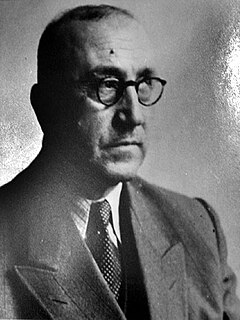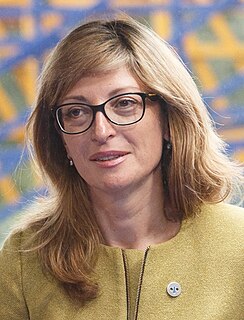| |||||
| Decades: | |||||
|---|---|---|---|---|---|
| See also: | |||||
Events in the year 1996 in Bulgaria .
| |||||
| Decades: | |||||
|---|---|---|---|---|---|
| See also: | |||||
Events in the year 1996 in Bulgaria .

The politics of Bulgaria take place in a framework of a parliamentary representative democratic republic, whereby the Prime minister is the head of government, and of a multi-party system. Executive power is exercised by the government. Legislative power is vested in both the government and the National Assembly. The Judiciary is independent of the executive and the legislature.

The Prime Minister of Bulgaria is the head of government of Bulgaria. They are the leader of a political coalition in the Bulgarian parliament – known as the National Assembly of Bulgaria – and the leader of the cabinet.

Kimon Georgiev Stoyanov was a Bulgarian general who was the Prime Minister of Bulgaria from 1934 to 1935 and again from 1944 to 1946.
Zveno was a Bulgarian military and political organization, founded in 1927 by Bulgarian Army officers. It was associated with a newspaper of that name.

Dobri Bozhilov Khadzhiyanakev was Prime Minister of Bulgaria during World War II.

The House of Saxe-Coburg and Gotha is a German dynasty that ruled Saxe-Coburg and Gotha, one of the Ernestine duchies.

The Tsardom of Bulgaria, also referred to as the Third Bulgarian Tsardom, was a constitutional monarchy in Eastern and Southeastern Europe, which was established on 5 October 1908, when the Bulgarian state was raised from a principality to a Tsardom. Ferdinand was crowned a Tsar at the Declaration of Independence, mainly because of his military plans and for seeking options for unification of all lands in the Balkans region with an ethnic Bulgarian majority.

Vasil Hristov Radoslavov was a leading Bulgarian liberal politician who twice served as Prime Minister. He was Premier of the country throughout most of World War I.

Dimitar Panayotov Grekov was a leading Bulgarian liberal politician who also served as Prime Minister.
The following lists events that happened during 1974 in New Zealand.

The University of National and World Economy is a university in Sofia, Bulgaria.

The Council of Ministers is the main authority of the executive power in the Republic of Bulgaria. It consists of the Prime Minister of Bulgaria and all the specialized ministers.

GERB is a conservative, populist Bulgarian political party established on 13 March 2006. The initials of the party герб/gerb also translate as "coat of arms" in Bulgarian. It is Bulgaria's second-largest party by membership.

The Axis leaders of World War II were important political and military figures during World War II. The Axis was established with the signing of the Tripartite Pact in 1940 and pursued a strongly militarist and nationalist ideology; with a policy of anti-communism. During the early phase of the war, puppet governments were established in their occupied nations. When the war ended, many of them faced trial for war crimes. The chief leaders were Adolf Hitler of Germany, Benito Mussolini of Italy, and Emperor Hirohito of Japan. Unlike what happened with the Allies, there was never a joint meeting of the main Axis heads of government, although Mussolini and Adolf Hitler did meet on a regular basis.

Bulgaria–India relations are the international relations that exist between the Republic of Bulgaria and the Republic of India.

Plamen Vasilev Oresharski is a Bulgarian politician who served as Prime Minister of Bulgaria from 2013 to 2014. Previously Oresharski was Minister of Finance from 2005 to 2009 in the Cabinet of the Triple Coalition with Prime Minister Sergei Stanishev.

The Oresharski Government was the eighty-ninth cabinet of Bulgaria which took office on 29 May 2013. The government, led by Prime Minister Plamen Oresharski, is one of technocrats created following the 2013 election. The cabinet was dissolved on 6 August 2014 to make way for a caretaker government that would lead Bulgaria through early elections in October of the same year.

Ekaterina Spasova Gecheva-Zakharieva is a Bulgarian politician who has served as Foreign Minister of Bulgaria since 4 May 2017. She was interim Deputy Prime Minister and Minister for Regional development from 2013.

Boyko Metodiev Borisov is a Bulgarian politician who has been Prime Minister of Bulgaria since May 2017. He was also Prime Minister from 2009 to 2013 and from 2014 to January 2017, making him Bulgaria's second-longest serving Prime Minister to date.
| This article about Bulgarian history is a stub. You can help Wikipedia by expanding it. |
| This year in Europe article is a stub. You can help Wikipedia by expanding it. |